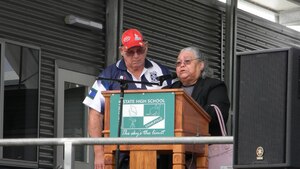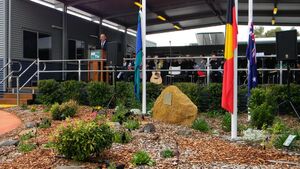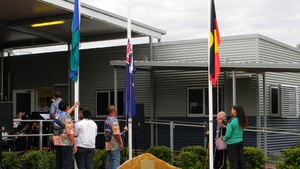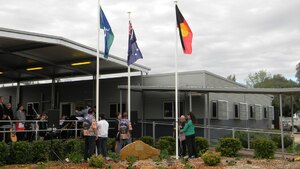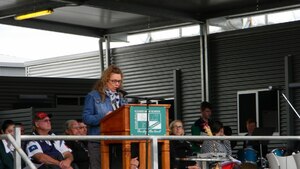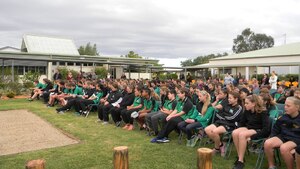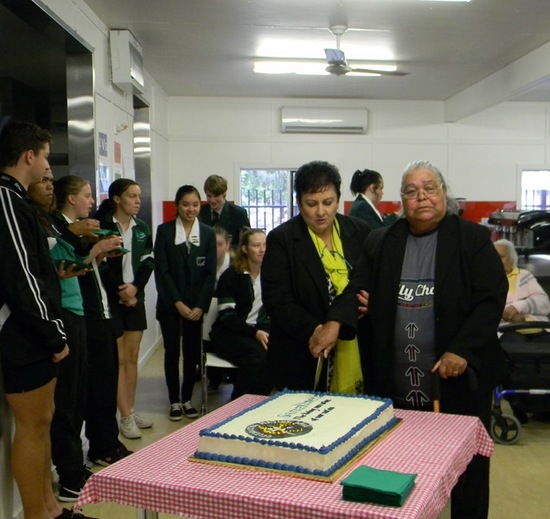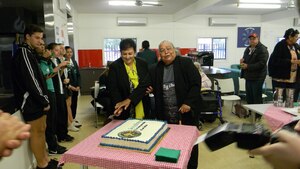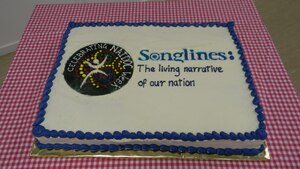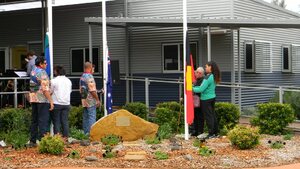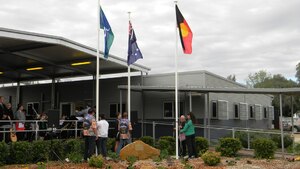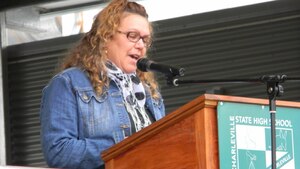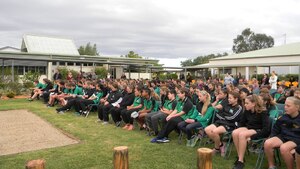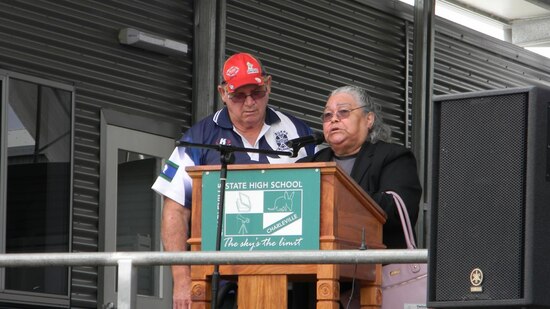20 July 2016
Newsletter Articles
Principal's Report
Welcome to Term Three, which is already shaping up as a very busy term for Charleville State High School. Term Three traditionally is always busy with many events such as NAIDOC week, Athletics Carnival, Year 11 Camp etcetera to mention just a few, along with Year 12 verification procedures.
Semester One Reports
I am pleased to report that we have seen some solid improvement in the A- C results of the students of Charleville State High School in Semester one when compared with previous years. It is very pleasing to see the hard work from both students and staff paying dividends as evidenced by student report cards. At Charleville State High School our target is that 85% of our students will receive an A-C. It is most pleasing to see that in addition to our achievement results that effort and behaviour results have improved and are at their highest levels in three years. I have included a graph below which is a summary of the results of our Semester one reporting when compared with the same time in 2015.
Parent/Teacher Interviews
Our Semester One Parent/Teacher interviews were held last Thursday evening. These interviews are a great opportunity for teaching staff to be able to have two-way communication with parents and students. The aim of these interviews is always to reflect on semester one and then look at possible courses of action which may lead to improved results in Semester Two. It was pleasing to see a great number of parents turn out to this evening. If you were unable to attend and would still like an interview, please contact the office who can make arrangements for this to happen.
Everyday counts
As you can see our students have received improved academic, behaviour and effort results in their Semester One Reports. For our students to continue to succeed, it is important that they are at school as often as possible. Obviously, we understand that there will always be extenuating circumstances which limit student attendance and if these can explained as soon as possible it ensures that we can accurately record student absences. During Semester One we averaged just under 90% for student attendance which while being consistent is still short of our target of 92%. It is very important that students are at school each and every day so that they give themselves the best opportunity to learn and thus limit any gaps in their learning which may occur.
Please click on the link to see a Youtube clip highlighting the importance of making "Every day count."
100% attendance
Last week on Assembly we had the pleasure of acknowledging our students who had achieved 100% attendance for Term two. It was very pleasing to see the number of students that received these awards and our students certainly are preparing themselves well for the future by attending school each and every day.
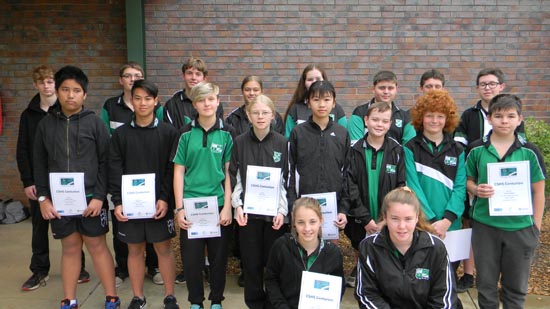
NAIDOC Week
Charleville State High School was very proud to hold the opening ceremony of NAIDOC week on behalf of the Charleville NAIDOC committee on Monday 18th July. NAIDOC week is a special week as the week celebrates the history, culture, and achievements of Aboriginal and Torres Strait Islander peoples. NAIDOC is celebrated not only in Indigenous communities but by Australians, from all walks of life.
This year the theme of NAIDOC week is "Songlines". The week is a great opportunity to participate in a range of activities and is an opportunity for Charleville State High School to celebrate indigenous culture and history.
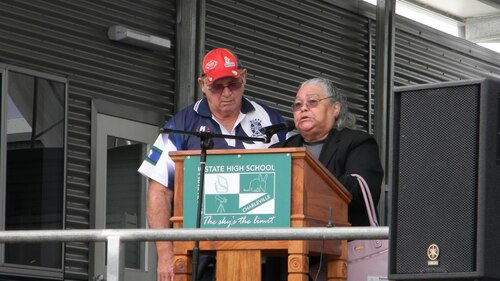
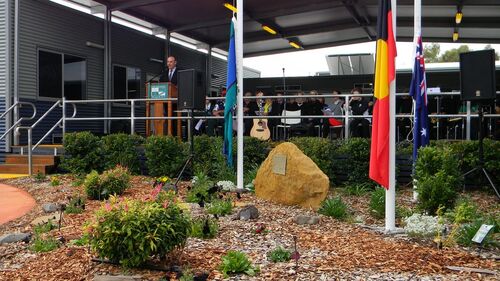
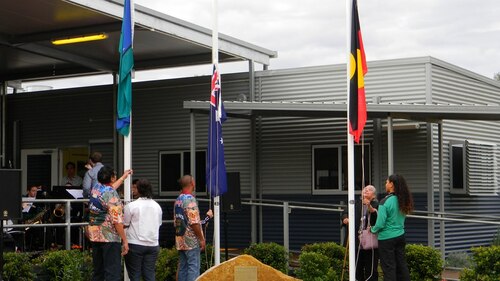
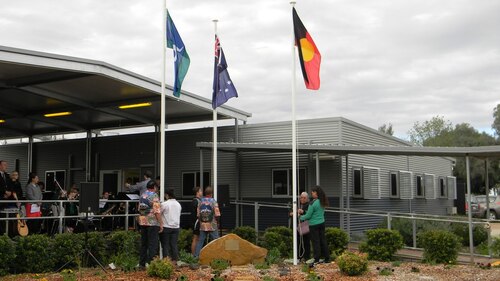
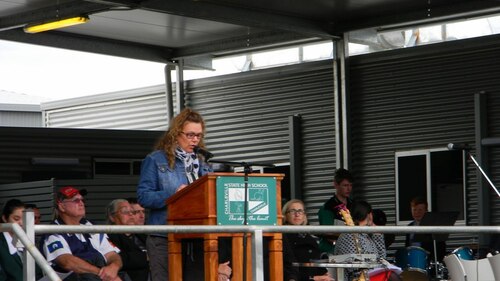
At Charleville State High School we have just under 30% of students that identify as being Indigenous and we embrace the week. In addition to the opening ceremony our students, this week will participate in Traditional games and also many other activities which are being run by the local NAIDOC committee. NAIDOC week will culminate with the NAIDOC march being held on Friday beginning at 9 am.
Starbucks Rewards Trip
This Friday our students that have met the requirements for our annual PBL trip will travel to Brisbane to watch the Brisbane Broncos play the Penrith Panthers at Suncorp Stadium. This trip is a wonderful reward for those students that display the "Charleville High Way" and in particular, demonstrate consistently the 4Be's and the 4V's of our school. Last year the trip was very well received by the students, and there were many comments about the experience. This Friday 55 students along with five staff members will depart. We wish the trip all the best and look forward to hearing the reports.
2016 Early School Leavers survey
The Queensland Government is conducting its annual state-wide survey of students who left school in Years 10 and 11 before completing Year 12 during 2015. The Early School Leavers survey is a short, confidential survey that collects information about what young people are doing the year after leaving school. The information from the survey helps schools to understand the pathways young people follow after leaving school and to plan services to support transitions into study or employment for our students.
Between July and August 2016, our students who left school in Years 10 and 11, before completing Year 12 last year, can expect to receive an invitation to complete a web-based survey or a telephone call from the Queensland Government Statistician's Office to complete the survey. Please encourage early school leavers to take part.
For more information, visit the link below or telephone toll-free on 1800 068 587.
http://www.education.qld.gov.au/nextstep/
Below is a couple of photo's that the P and C Association got made to celebrate our June meeting.


It is important to us that every day, in every classroom, every student is learning and achieving. Charleville State High School thanks you for your support in this partnership.
Marcus
Welcome back to Semester 2 2016. I am not sure exactly where the past six months have gone but we are certainly well on the way to finishing the year quickly. To put it in perspective, our Year 12s have only 16 weeks left in school and then it is the big wide world for them. The question then is what can our students do to ensure they are as successful as possible? What advice and guidance can we give? What good habits should we be encouraging and supporting our students to develop to ensure success in the future?
How can our students be successful?
Work hard
Have clear goals and work towards them
Do everything to the best of your ability
Ask for help when you need it
Manage your time effectively
What is the most important thing for a student to do?
The most effective thing a student can do is to find the best way to manage their time effectively and know what they want to work towards.
Before you can even begin to manage time, you must learn what time is. A dictionary defines time as "the point or period at which things occur." Put simply, time is when your life happens.
There are two types of time: clock time and real time. In clock time, there are 60 seconds in a minute, 60 minutes in an hour, 24 hours in a day and 365 days in a year. All time passes equally. When someone turns 20, they are exactly 20 years old, no more or no less.
In real time, all time is relative. Time flies or drags depending on what you're doing. Two hours at exam time can feel like 12 years and yet our 12-year-old children seem to have grown up in only two hours.
The good news is that real time is mental. It exists between your ears. You create it. Anything you create, you can manage. It's time to remove any self-sabotage or self-limitation you have around "not having enough time," or today not being "the right time" to take advantage of an offer or start a maths assignment.
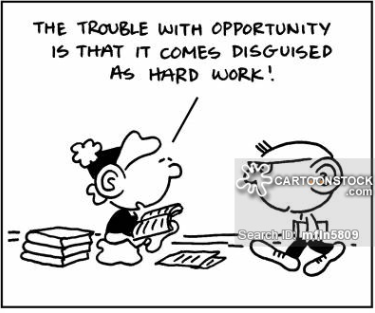
How can students manage this elusive concept of time though?
Seven Suggestions for Effectively Managing Your Time
1. Be Organized
- Use time saving tools: appointment calendars, "to do" lists, e-mail, answering machines, file folders, etc.
- Have an organized workplace (don't waste time constantly looking for your work).
- Use your calendar for everything, including listing study time.
- Use "to do" lists for both long-term and for each day/week.
2. Plan Ahead (Schedule it and it will happen!)
- Determine how long your tasks will take
- Consider whether any activities can be combined.
- Determine if big tasks can be broken down into smaller tasks that may be easier to schedule (such as studying for exams and visiting the library as part of an assignment to write a term paper).
3. Prioritize Your Tasks
- Use an A-B-C rating system for items on your "to do" lists with A items being highest priority.
- Set goals for both the short term and long term as to what you want to accomplish.
- Look at all of your "to do's" to gauge the time requirement and whether additional resources will be needed to accomplish them (if yes, schedule time to obtain those resources). Don't postpone the small tasks (a sense of accomplishment is good and overlooked small tasks can become larger tasks.)
4. Avoid Overload
- Include time for rest, relaxation, sleep, eating, exercise, and socializing in your schedule but don't let these overtake your key tasks
- Take short breaks during study and work periods.
- Don't put everything off until the last minute (for example, don't cram for exams the night before).
- Learn to say "no" when appropriate and to negotiate better deadlines when appropriate.
5. Practice Effective Study Techniques
- Have an appropriate study environment which is not in front of the television, mobile phone or iPad, unless these forms of technology are a part of homework tasks.
- Split large tasks into more manageable tasks.
- Read for comprehension, rather than just to get to the end of the chapter.
- Be prepared to ask questions as they come up during study, rather than waiting until just before an exam.
- Do the most difficult work first, perhaps breaking it up with some easier tasks.
- Don't wait until the last minute to complete your projects.
- Read the syllabus as soon as you get it and note all due dates (and "milestone" times) on your calendar.
- Be a model student! (be attentive and participative in class, and punctual, prepared, and eager to learn)
6. Be Able to be Flexible
- The unexpected happens (sickness, car troubles, etc.); you need to be able to fit it into your schedule.
- Know how to rearrange your schedule when necessary (so it doesn't manage you - you manage it).
- Know who to ask for help when needed.
7. Have a Vision (why are you doing all of this?)
- Don't forget the "big picture" - why are you doing the task - is it important to your long-term personal goals?
- Have and follow a personal mission statement (personal and career). (Are your activities ultimately helping you achieve your goals?)
- Know what is important to you. (What do you value most?)
- Have a positive attitude!
WHAT DO STUDENTS NEED TO FOCUS ON?
STUDENTS AND ASSESSMENT
Students will be provided with a copy of their assessment due dates for Semester 2. This includes exam dates, when drafts are due and any other tasks they are required to complete across their chosen courses of study for this semester. If you have not sighted a copy of this document please check your student's diary or ring the school and we can provide a hard copy to put on the fridge.
This semester the assessment dates will be generated in Oneschool. This allows for each student to access their assessment dates online (through Oneschool) at school or at home. It allows students to print off a new assessment calendar for themselves if they have lost the one provided to them.
Requirements for senior students and assessment
Assessment needs to be attempted on or
before the due date (including exams and oral presentations)
Assessment must be able to marked against all
criteria – i.e. a name on a piece of paper is not enough to be given
a grade for an assessment piece
Assessment must be the student's own work, not
that of anyone else – e.g. plagiarised.
Assessment will be submitted by all students,
even if after the due date, to ensure a full range of skills are
demonstrated for effective feedback for all students
Work submitted after the due date may not be able
to be given a grade
Late assessment will incur 15 points per piece as
an element of the Senior Student Accountability Program (SSAP)
What can senior students do to help themselves?
Attend school and classes
regularly (must be a minimum of 90% - unexplained absences will incur 2
points per absence as a part of the SSAP, and possibly lead to a
cancelation of the enrolment due to a lack of engagement with the
educational processes provided and course coverage)
Plan ahead - use the assessment dates and planner
given out last week to help organise your time for Semester 1 and map out
when you will need to work on assessment
Attempt all work, at school and home, set by
staff
Seek feedback and ask questions about all tasks –
see your teachers before or after school, during lunch breaks or in class
if there are opportunities to do so
Submit full drafts when required
Submit all tasks on time – including sitting
exams and presenting oral tasks
Talk to staff if there are any concerns well
before the due date
Attend study / homework club for further help
(need to have submitted a permission form – collect one from Mr Kohli if
you want to participate)
Apply for an extension (at least a week before
the due date) if there is evidence to support the application. See Mr
Kohli, Head of Department Senior Schooling, if you need to request this
option.
How can you help your student through the stress of study and assessment?
Know when their assessment due dates are and help
plan
Ensure they are getting quality sleep
Ensure they are eating well
Ensure they have some 'down time' – some weeks may have more than
others
Ensure that homework is attempted –e.g. going over class notes and ideas
each day
Ensure they are asking staff for help if they are struggling at home
Contact the school if you have any concerns
What has been happening at CSHS?
Think the Drink On Tuesday 19th July our Year 12 students participated in the 'Think the Drink' program at the RSL. The day covered a range of topics, including the legalities of life after school from a publican's perspective; safety while travelling to and attending schoolies; road safety; and, finally the role of emergency services in incidents that often involve young people. As is the case every year, the message was well received, supported by the close supervision of Mrs Peacock, Ms Day, Mr Kohli and Mrs Gilvarry. Thank you to all the presenters ranging from Red Frogs, the QPS, QAS, Fire and Rescue as well as the RSL.
Thank you for your continued support of your student, the school and the educational process. If you would like any further information regarding the topics above please don't hesitate to contact the school. Together we can make a difference in the lives of our future leaders.
Regards
Donna Gilvarry
Deputy Principal
Year 10 2016 - SET Planning and senior subject selections
Year 10 Students
The focus for our Year 10s this term is developing their plans for their future. This focus will culminate in their SET Planning interviews on Tuesday 23rd August.
But what is a SET Plan? Why do we place such value on this event?
What is a SET (Senior Education and Training) Plan?
As part of planning for the transition to post-school options, Queensland students in Year 10 complete a Senior Education and Training (SET) plan. Essentially, the SET plan includes what the student's goals are, and what pathways they're going to take to reach those goals. Parents and school staff are involved in helping students put these plans together.
While the SET plan helps students to make decisions about their future, they can still make alterations to their SET plan if they change their minds. The plan is a fluid document, based on Oneschool, and should be updated to reflect changing student ideas and aspirations throughout Year 11 and 12.
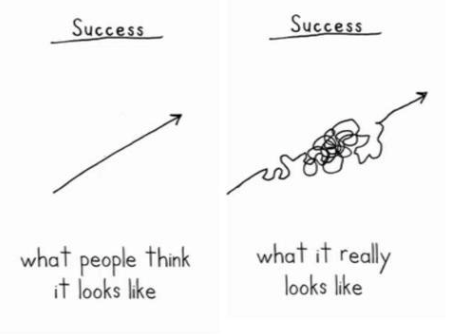
Why is SET Planning so important?
By the time your child is finishing Year 10, you and your child should be planning and preparing for life after school. It is important to talk to your child about what their interests, abilities and aspirations are, and find out about the options available to them.
What needs to be considered? It is important that students consider the following:
- occupations and career pathways
- the education and training requirements needed to achieve selected goals, such as subject prerequisites
- the full range of learning opportunities available
- the value of different forms of learning
- tertiary entrance procedures, including the range of options.
What happens next?
- Our Year 10 will be exposed to a range of specific careers and senior subject lessons in Pastoral Care from Week 1 Term 3 through to SET Planning interviews in late August. Students will work on developing personal goals, identify potential interests for the future and enter information into their Oneschool profiles.
- Participate in senior subject lessons and activities across all faculties lead by Heads of Department and senior teachers.
- Parents will be sent a letter outlining who will interview their student, in their presence, to complete the SET Plan and select senior subjects for study in 2017/18.
- Interview time to be selected by parents
- SET Planning interview and subject selections
- Students continue to develop skills to help in senior subjects across Semester 2.
If you would like any further information regarding the topics above please don't hesitate to contact the school. Together we can make a difference in the lives of our future leaders.
Regards
Donna Gilvarry
Deputy Principal
STUDENT SERVICES NEWS
NAIDOC WEEK CHARLEVILLE- SONGLINES- A Living Narrative of Our Nation
NAIDOC Week 2016 is upon us and students from CSHS will be involved in a number of activities this week. Monday saw our school host the Opening Ceremony and Tuesday the Senior School leaders accompanied Mr Jones and myself to the liturgy held at St Mary's School. Thursday will see the CWAATSICH team descend on the school with a variety of resources to play Indigenous Games with the students and the week of course culminates with the march to Charleville State School. A note has been sent home with all students and been put on the app outlining the march and is also attached to this newsletter.
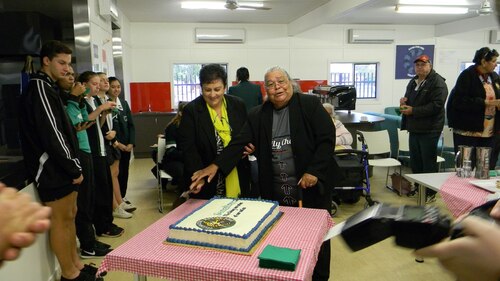
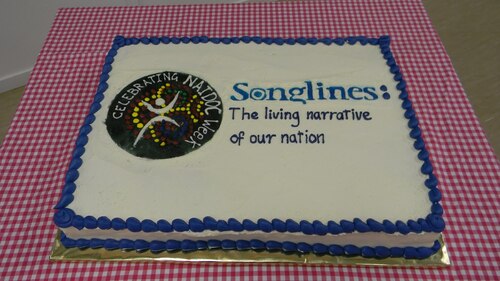
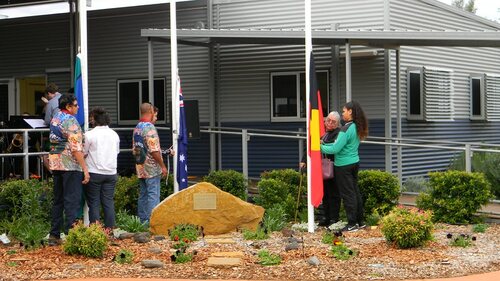
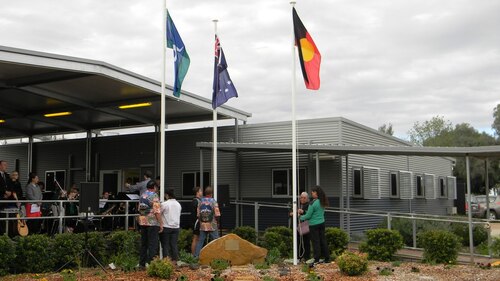
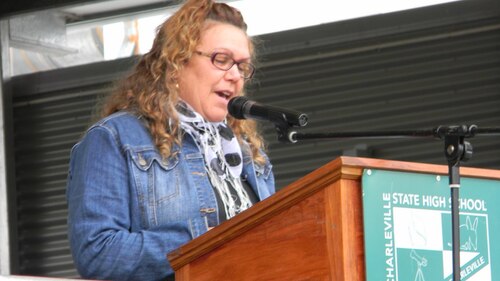
WELCOME TO MRS GEORGIA GRANT- Head of Special Education Services
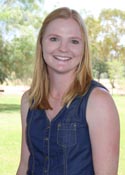
At the commencement of Term 3, Charleville State High School has been lucky enough to secure a Head of Special Education Services to add to our support team. Georgia will work closely with myself and SWD teacher, Mrs Cheryl Auchter to ensure the needs of our verified students are being met through curriculum delivery, alternate school options if applicable and transition after senior schooling right through to their social and emotional wellbeing. Georgia will take over the case management of some students and if this affects your child she will be in touch with you as soon as possible. Georgia will also support Charleville School of Distance Education and Cunnamulla P-12 State School.
WELCOME NEW READING TEACHERS- Ms Liz Nicholls and Miss Lauren Butler- THANK YOU MRS ANGELA STIRTON
I know Ms Nicholls and Miss Butler will be writing an article for the LLI Reading program for this newsletter but I would like to officially welcome them to the program and know that it has passed from Mrs Angela Stirton into very good hands. If parents have any questions now about the program they can speak to Liz or Lauren who will both be more than happy to help.
With the addition of two new staff to the program instead of one it also means we have been able to add more students to the program allowing it to be run with Years 7-11.
I would also like to take this opportunity to thank Mrs Stirton for the tireless amount of work she has put into the program so it can be handed so seamlessly to new staff.
STUDENT SERVICES- UPCOMING EVENTS
CWAATSICH HEALTH MUSTERS- 26th and 27th July- The final Health Musters will go ahead at the end of July. Most students have now participated in the musters. If you have not returned your forms and would like your child to be seen by a variety of health care providers please get them back to the office as soon as possible. It is not too late to be included regardless of what year level you are in- we will make sure every student who has returned a form has an appointment. If you would like another permission form or want to check if your child has returned their forms please contact Mrs Jenni Peters.
NATIONALLY CONSISTENT COLLECTION OF DATA (NCCD)
A flyer outlining this information and more has been added to the newsletter. Parents also have the option to opt out of the collection. If you have any further questions please contact Mrs Jenni Peters, who is looking after the NCCD this year.
EAL/D SERVICES- WELCOME TO THE ROLE, MRS ANNA BATSTONE
It is with great pleasure I can announce that Anna Batsone (nee Nevell) will be joining us one day per fortnight to support our students with English as an Additional Language. Anna will work with the students both in and out of the classroom as well as liaise with teachers and parents. Anna will also be support by the Regional EAL/D Advisor Kath Symmons from Toowoomba. Anna will organize a meeting with parents soon using the interpreter service. Her first day is this Friday.
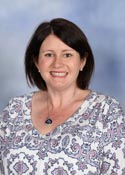
Until next time,
Jenni
Deputy Principal- Student Services
2016 School Opinion Survey
It is that time of year again- School Opinion Surveys are on their way home to parents. In the information posted home, parents have been provided with two codes that allow each household to access the School Opinion Survey online.
School Opinion Surveys are undertaken each year by the Department of Education and Training to obtain opinion information from parents/caregivers, students and school staff. The surveys are designed to help schools identify what they do well and how they can improve.
Opinions on the school, student learning and student well-being are sought from a parent/caregiver in all families and a sample of students from each state school. If you are unable to access the online survey at home you are more than welcome to use the school's computers in the library on Thursday 28th July from 3:30-4:30pm.
Thank you for your continued support of your student, the school and the educational process by completing this survey. If you have any questions or require any other assistance in access the link below please do not hesitate to contact the school on 4656 8888.
http://education.qld.gov.au/schoolopinionsurvey/
Regards
Donna Gilvarry
Deputy Principal
Reading Corner
This term, the Levelled Literacy Intervention (LLI) reading program is bigger and better than ever. Miss Butler and Ms Nicholls will continue to maintain the fantastic work of Mrs Stirton and build on her progress with new and continuing students. Students will now have the opportunity to improve their reading, vocabulary and comprehension skills by engaging in the program four lessons a week. This is the recommended amount of lessons as per the program to ensure students' progress with their reading and achieve success. Students will read a wide variety of fiction and non-fiction texts to extend their knowledge about a variety of topics.
LLI is designed to equip students with the strategies to read independently with fluency and accuracy. Below are two strategies to assist your child with reading:
Look at the illustrations, diagrams,
photographs, text layout for clues
Attend to details when searching for information in symbols, illustrations
and diagrams
Predict words by locating and interpreting relevant information from
illustrations, diagrams, photographs, text layout
Look at the first letter and predict what sound it should make. This can help to predict what the word might be.
Yours in reading,
Liz Nicholls and Lauren Butler
Master Teacher
A Master Teacher has various roles in Education Queensland. One of these is to improve and enhance pedagogical practice by all staff by researching and modelling quality teaching across all year levels. Developing and using Higher Order Thinking Skills is one of the main focus that I have been working on at CSHS. I have been working with the School Improvement Unit in DDSW developing a tool that analyses the NAPLAN tests for numeracy and identifies which areas our students need to develop in their Problem Solving Skills. This tool is still in the development stage but the process is quite interesting. I have also been investigating the IMPACT Learning Framework which uses a Neuroscience approach to teaching. I have the privilege of teaching a small group of Year Ten students who have been helping me develop these new skills in order to share our successes with other staff to further develop their teaching skills to assist students to THINK with a more positive approach. Along with the Explicit Teaching Framework, staff at Charleville State High are always examining their pedagogical practice and ensuring all students are Learning.
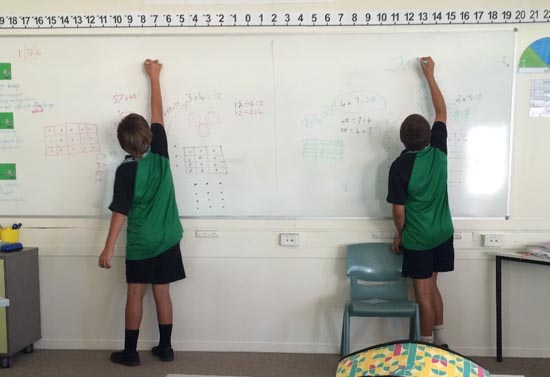
Info from the GO
Understanding the power of a your digital footprint
The internet has so much to offer and is a very exciting place for today's secondary school students. They spend hours chatting with friends and family, researching school assignments, playing online games and interacting on social media sites.
While there are so many great things to see and do online, it's important they are a responsible and respected online citizen, just like in the real-world.
What they post online, they post to the world. This is known as their digital footprint. Future partners, employers, workmates and landlords may view what they believe they're just sharing with their friends. Once it's online, it could be there forever!
To keep their footprint positive, work with your teens and ensure they understand the following steps:
The 7 steps to a positive digital footprint
- Google yourself—Look closely at your search results beyond the first page—check your various aliases and usernames. If you find content you don't want to be shared, remove it, report it or ask your friends to 'untag' it.
- Think before you share—Consider the outcomes of messages before you share them online. Ask yourself, is it true, useful and positive?
- Check your privacy settings—Regularly update general privacy settings—websites often add and remove new security options without notifying users.
- Delete unused accounts and apps—Hiding or removing irrelevant and old content will help keep your digital footprint up-to-date.
- Check your friends list—Is there anyone you should remove from your networks? Think twice before you add 'randoms' to your friends list.
- Keep your devices close…—Your mobile, tablet and computer contain a large amount of personal information. Secure your devices with a passcode or pin and store them in a secure place.
- and your passwords closer—Never share passwords, don't use the same passwords for similar accounts and change your passwords regularly.
With the internet playing such an integral part in the lives of our young people, it is important that they understand the impact their digital footprint can have on their future.
http://www.qld.gov.au/education/schools/health/cybersafety
Building Resilient Families – Parent Information Session
Life for any family includes ups and downs, challenges and unexpected twists and turns in the road. A family's ability to negotiate this journey and keep going depends on the skills they are working on along the way. There are certain skills and strategies that have been identified as important for the development of resilience. Some are internal skills we can build and develop, whilst others external, which encompass the relationships in children's lives. Families can draw upon these skills to build successful strategies to bounce back after challenging times. This seminar will enhance your understanding of the importance of interactions, connectedness and relationships in assisting children to build resilience.
A parent information session on Building Resilient Families will be held at St. Mary's Performing Arts Hall on Thursday 4th August, commencing at 5pm. The information session is open to all parents of both primary and secondary school students and the wider community.


